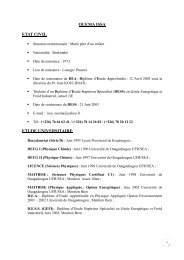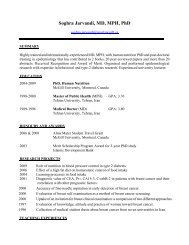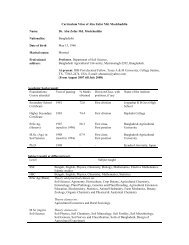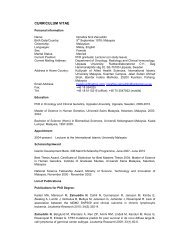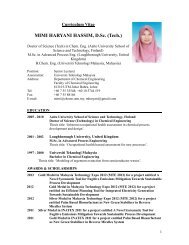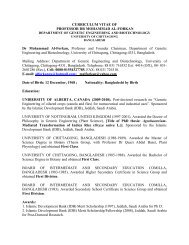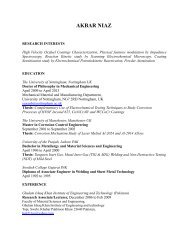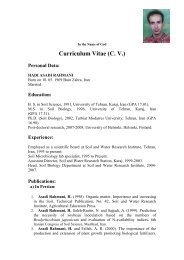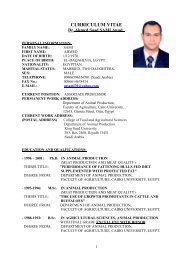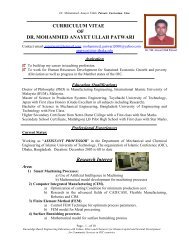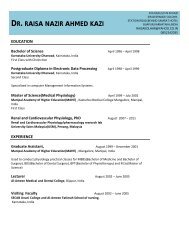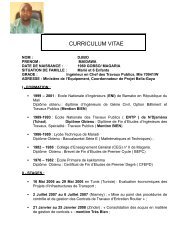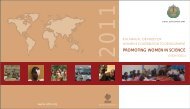Engineering: issues, challenges and opportunities for development ...
Engineering: issues, challenges and opportunities for development ...
Engineering: issues, challenges and opportunities for development ...
Create successful ePaper yourself
Turn your PDF publications into a flip-book with our unique Google optimized e-Paper software.
ENGINEERING CAPACITY: EDUCATION, TRAINING AND MOBILITY■Broaden the focus to include middle <strong>and</strong> later career assistance<strong>and</strong> recognition.Credit Transfer System (ECTS), as well as the promotion of theEuropean Dimension in Higher Education.■training<strong>and</strong>Encourage a whole-of-career approach to education,recognition.■Accommodate all accords <strong>and</strong> <strong>for</strong>ums into a truly internationalalliance with a single post-nominal <strong>for</strong> each categoryof practitioner.7.5.3 The Eur Ing <strong>and</strong> BolognaAccordWilli Fuchs <strong>and</strong> Iring WasserAcademic <strong>and</strong> professional mobility of engineers in Europe,<strong>and</strong> indeed worldwide, is becoming an ever-growing concern<strong>for</strong> the engineering community, as well as <strong>for</strong> policy-makers.It is an undisputed fact that future prosperity of societies <strong>and</strong>economies relies in no small part on the unrestricted mobilityof its most productive work<strong>for</strong>ce – the engineers of thetwenty-first century.The engineering community in Europe has reacted <strong>and</strong> recentlyrenewed its commitment to foster academic <strong>and</strong> professionalmobility on the continental scale. Among the most importantinitiatives is the European Accredited <strong>Engineering</strong> Project(EUR-ACE). As a result of this project, a single European system<strong>for</strong> accreditation of engineering education has been established.In 2005, the project partners have unanimously agreedon the EUR-ACE ‘Framework St<strong>and</strong>ards <strong>for</strong> the Accreditationof <strong>Engineering</strong> Programmes’. Furthermore, a consensus withregard to the future organization <strong>and</strong> management of the EUR-ACE accreditation system has been reached. In 2006, the EuropeanNetwork <strong>for</strong> the Accreditation of <strong>Engineering</strong> Education(ENAEE) was founded. One of its most important partners isthe European Federation of National <strong>Engineering</strong> Associations(FEANI), which has agreed in principle to accept the results ofa EUR-ACE accreditation as an academic prerequisite <strong>for</strong> theinclusion of engineering graduates in its register of EuropeanProfessional Engineers (EUR-ING).European accreditation <strong>for</strong> academic <strong>and</strong> professionalpurposesAccreditation of engineering education in Europe servesimportant purposes <strong>for</strong> society. In the framework of the BolognaProcess, it is an essential prerequisite <strong>for</strong> the completion ofthe European Higher Education Area (EHEA) by the year 2010.The EHEA strives <strong>for</strong> a European knowledge society characterizedby high mobility <strong>and</strong> by high-quality lifelong learning<strong>opportunities</strong>. This is to be accomplished by the promotion ofeasily comparable degrees, cyclical <strong>and</strong> permeable study structures,a European ‘Diploma Supplement’ <strong>and</strong> the EuropeanWithin the narrower realm of the common European market,which depends on principles such as freedom of movement ofworkers, rights of establishment <strong>and</strong> freedom of services <strong>for</strong>its prosperity, another focus comes into play. Only recently,a new European Directive on the recognition of professionalqualifications 86 was passed in order to establish a clear, secure<strong>and</strong> fast system <strong>for</strong> the recognition of qualifications in the fieldof the regulated professions <strong>and</strong> to ensure free movement. TheEuropean Union institutions <strong>and</strong> Member States were calledupon to facilitate employment <strong>and</strong> the provision of servicesthrough wholesale consolidation of the existing regimes ofprofessional recognition. In the sensitive area of engineeringmobility <strong>and</strong> employment, there is a great need <strong>for</strong> validatedprocedures to recognise engineering degrees <strong>and</strong> professionalqualifications of engineering graduates. Transnational cooperationin the field of quality assurance <strong>and</strong> accreditation hasbeen one of the most promising avenues to achieve this goal<strong>and</strong> to fulfilling the promises of the Lisbon Convention, whichaspires to make Europe the most advanced knowledge societyin the world.Impediments <strong>for</strong> transnational recognition ofengineering degrees in EuropeAcademic <strong>and</strong> professional mobility of engineering students<strong>and</strong> graduates in Europe are facing manifold <strong>challenges</strong>. Therecontinues to be a considerable diversity of both engineeringdegrees in terms of duration, content <strong>and</strong> institutional background<strong>and</strong> consequently public knowledge about their qualityis at times insufficient especially across national borders.This degree <strong>and</strong> institutional diversity is matched by a greatvariety of national quality assurance <strong>and</strong> accreditation systems.There are a number of initiatives under way on the Europeanscale to foster transnational recognition of accreditationresults (such as the planned institutionalization of a Europeanregister of quality assurance agencies that follow a code ofgood practice <strong>and</strong> the European st<strong>and</strong>ards <strong>and</strong> guidelines),but thus far transnational recognition needs to be bolstered.Precautions against fraudulent obtainment of degrees havebeen taken. Add to this the virulent problem of a growing nonofficialhigher education sector <strong>and</strong> the phenomenon of transnationaleducation with a lack of regulatory codes, <strong>and</strong> thedimension of the challenge becomes obvious.Furthermore, in some European countries the academic degreeconstitutes the automatic admission ticket to the nationaljob market whereas in others additional prerequisites such asproof of a certain period of recognized training programmesor validated professional engineering experience are required.86 Directive 2005/36/EC of the European Parliament <strong>and</strong> of the Council on the recognitionof professional qualifications, 2005-09-07.363



